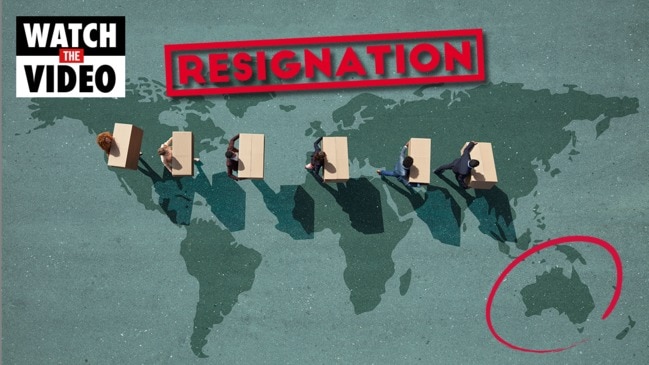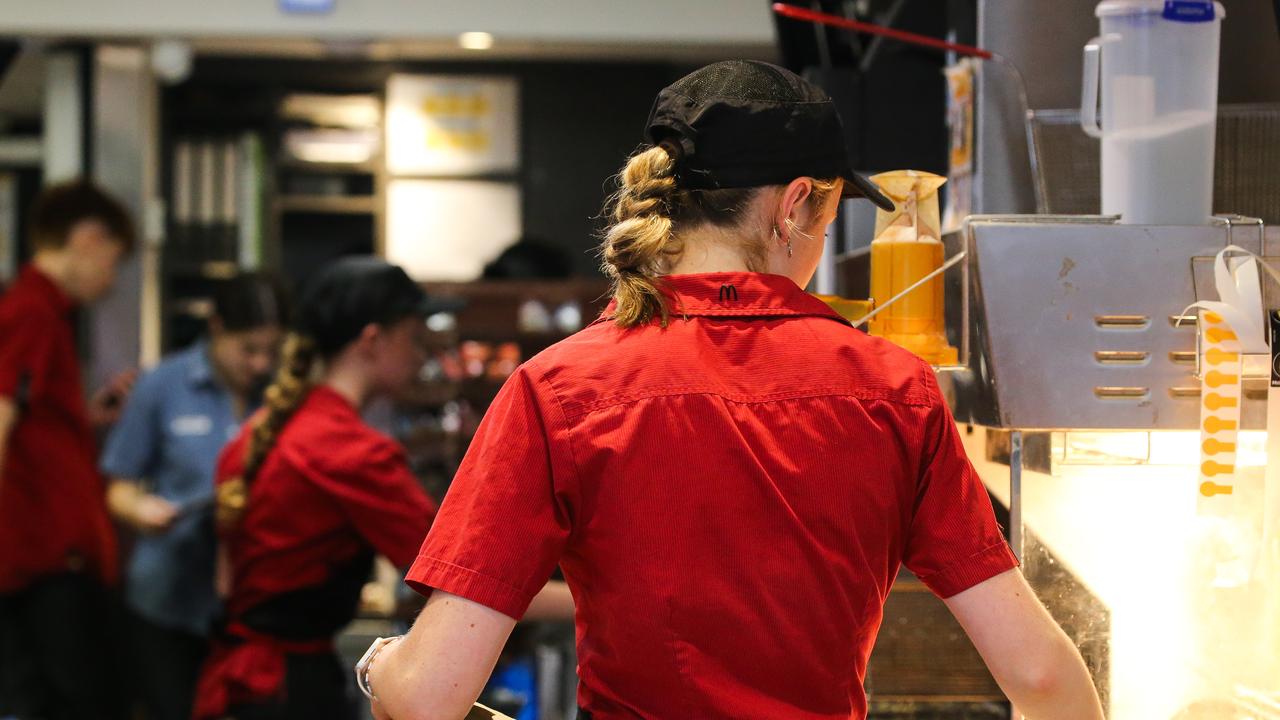The Great Resignation: Aussies prepared to quit six figure jobs
A terrifying shake up of Australian workplaces is looming with fed up employees resigning from jobs that pay as much as $120,000 with nothing else lined up.

At Work
Don't miss out on the headlines from At Work. Followed categories will be added to My News.
Australians are throwing in six figure jobs with nothing to go to, preferring to be unemployed than unhappy at work, and are even “quitting” the country because they don’t believe they can ever get ahead.
A seismic shake up of Australian workplaces is looming and should terrify employers.
The Great Resignation is set to slam Australian workplaces in the next six to 12 months with 2 million people ready to quit their jobs, research from Allianz Australia showed.
But the days of Australian employees suffering in silence are long gone too, with 50 per cent of Gen Z and over 39 per cent of Millennials revealing they would rather be unemployed than unhappy in a job, recent research from recruiter Ranstad revealed.
‘Terrible’ burnout
Justine* is one Australian who has taken the leap of quitting her job one month ago without another role lined up because she is “just too tired”.
The Melbourne woman is leaving behind a salary of $105,000 but doesn’t want to risk suffering burnout again after a “terrible” experience last year.
Want to stream your news? Flash lets you stream 25+ news channels in 1 place. New to Flash? Try 1 month free. Offer ends 31 October, 2022 >

Working for a creative agency, Justine said during Melbourne’s brutal lockdowns she was working 10 to 11 hour days, which at times would involve “endless” Zoom meetings back-to-back for five hours.
“I burnt out last year and had never suffered burnout – it’s terrible. My brain just stopped working and it was like I couldn’t think,” she told news.com.au.
“The doctor put me on two weeks of stress leave and that was just after my boss was on two weeks of stress leave.
“I have a pretty high tolerance for stress working in the advertising world. My boss was out for two weeks on stress leave and I was in charge of the agency for two weeks and it just pushed me over.”
The 30-year-old said the environment was exacerbated by colleagues being let go during the pandemic and her company slashing what it was charging clients, meaning the workload also piled up, describing it as the “perfect storm of stress”.
Have a similar story? Continue the conversation sarah.sharples@news.com.au

Wouldn’t stay for an extra $40,000
Justine said she had been wanting to quit her job for the past year but “chickened out too many times” but once she finally did it she realised she wasn’t scared at all but excited.
“I felt bad about letting the team down – all those typical Millennial problems – but I realised it was never going to be a perfect time to quit and I can’t keep prioritising my workplace’s wants and needs over my own health,” she said.
“They asked me if there anything they could do to make me stay, which is obviously good management on their part, but I had already gone through that thought experiment that there is nothing you could do to make me stay.
“I need a new experience and new place and I need to not be constantly stressed out of my mind.
“It doesn’t matter if they threw an extra $20,000, $30,000 or even $40,000, I wouldn’t stay.”

50 per cent to leave if no work-life balance
The creative said she is taking the rest of the year off, which will include a six-week, screenfree stay on a remote island in Asia, and plans to look for a job in the new year, but insists things will have to be very different. .
“I’m getting a job that is remote, or four days a week and flexible, or at a place that actually understands the work-life balance,” she added.
Four in 10 employees from Australia and New Zealand are considering leaving their current company because it does not match their values, according to a survey from experience management firm Qualtrics.
More than half of the 1605 respondents to the study said they would likely look to leave their employer if the company did not meaningfully prioritise work-life balance or wellbeing.
Simon* recently quit his $120,000 job less than six months into the role due to a lack of work-life balance.

Just a month into the new job working as an analyst, his boss left and he was “unwillingly” promoted but also expected to do the role he was originally hired in, with the promise a new staff member would be on board soon.
But that help never came and he was out of his depth in the higher position, yet was given bizarre advice.
“One of the managers said you can learn on the job and do extra work while you are watching TV at night. I am happy to do the hours I am getting paid for and a little extra but if you’re asking me to learn a whole new different task outside of my work hours that’s extremely unreasonable,” he told news.com.au.
“So I basically told her to get stuffed and then she became my manager. It was funny at the time but pretty stressful during that period.”
Resigned on the spot
The 38-year-old said he was even “forced” to work unpaid over the Christmas break as he was told there was going to be “important meetings” that needed to be organised and prepared for people’s returns.
The extra workload led to the dad-of-one becoming burnt out, resulting in him using up all his sick leave, and came after a previous role where he was working 5:30am to 6:30pm days.

But the burnout wasn’t even what tipped him to quit his six-figure role with no job lined up.
It was his boss declining his request for unpaid leave to take his ill son to the doctor, insisting he had to come into the office for an “important meeting” and claiming his wife should deal with their child.
He said it was the “last straw” and he resigned on the spot.
The Melbourne man has spent the last few months focusing on his most important role – being a full-time dad.
But he is now looking for a part-time role, which would mean up to a $40,000 pay cut.
Yet even then he said he’s had “hideous” encounters with at least six recruiters who contacted him over LinkedIn only to be met with “radio silence” when he replied.
He said his boss’ lack of care for his family situation and now his experience with job hunting has him questioning people's values towards employees, describing them as “plain rude”.
“I’ve found the pandemic has caused people’s sense of care and communication to go down the drain,” he added.
The dad said he’s also felt misled as jobs are promoted as being flexible but in interviews companies are insisting people have to come into the office.

‘Job-washing’
Randstad warns a practice called ‘job-washing’ – where employers overpromise and under deliver to secure talent in a tight market – could also come back to bite companies.
It found 67 per cent of Australians actively open to new job opportunities, showing no hesitancy to move on if a role doesn’t match expectations.
Over half of Gen Z said they wouldn’t work for an organisation that doesn’t align with their values on social and environmental issues, while the majority of employees under 35 years of age said they would quit their job if it prevented them from enjoying life, the research showed.
A staggering six in 10 Gen Z workers wouldn’t mind earning less money if they felt their job was contributing something to the world or society, compared to only a fifth of Baby Boomers.

‘Quitting Australia’
But Andrew, who did not want his surname used, is going even further than resigning from his job and has declared he is “quitting Australia”.
“After two year’s of Melbourne lockdowns during which I worked in a higher risk role as an in-home internet technician, TPG made me redundant in April earlier this year, just 49 days before my long service leave ticked over,” he explained.
He described the redundancy as “brutal” especially as he went into people’s homes during the pandemic potentially exposing himself to Covid and yet two years later he said he was just “tossed away”.
“The 49 days was extremely disappointing. I had been looking forward to that and taking a couple of months off to do some extended travel and to regroup after the last two years,” he said.
While the Melbourne man had no problem finding a new role, he was shocked by the lack of flexibility with staff told to come into the office five days a week.
The 34-year-old had also requested a pay review at the end of his three month probation at his new company but said this never came to fruition, and with no option to work from home, he decided to quit.
Instead he is moving to Canada, despite recently house hunting for two bedroom units in the $450,000 to $600,000 range.

‘Kind of sh**ty’
Andrew said with two years of harsh lockdowns combined with the cost of living suddenly going “crazy”, wages not going up and then interest rates spiking “rapidly”, he said there is the “consistent feeling like nothing is ever going to be getting me ahead”.
“Despite the news cycle constantly being about the rising cost of living and pressures of life, no employer or workplace seems interested in addressing this at all, so I’m leaving,” he said.
“Six months ago I was looking at apartments and speaking to brokers. I have a large chunk of change saved for a hefty deposit and my own place.
“But the massive and sudden interest rate hikes put that on hold and the general uncertainty, lack of job satisfaction and no incentive to even stay in my job or in Australia have seen me decide to abandon it for two years abroad and completely opt out of this monotony.”

The 34-year-old said he already had a job lined up to do the ski season in Canada before getting a campervan for the summer and travelling around the country.
He added many of his Millennials friends felt the same about constantly taking a hit from various crises plaguing the country.
“I definitely have got a general consensus across all my friends that everything is a bit kind of sh**ty,” he added.
“As much as companies are complaining about people not wanting jobs, it also feels like they don’t want to pay people properly to have the jobs, it’s these weird total warp.”
*Names have been changed for privacy reasons
Originally published as The Great Resignation: Aussies prepared to quit six figure jobs





